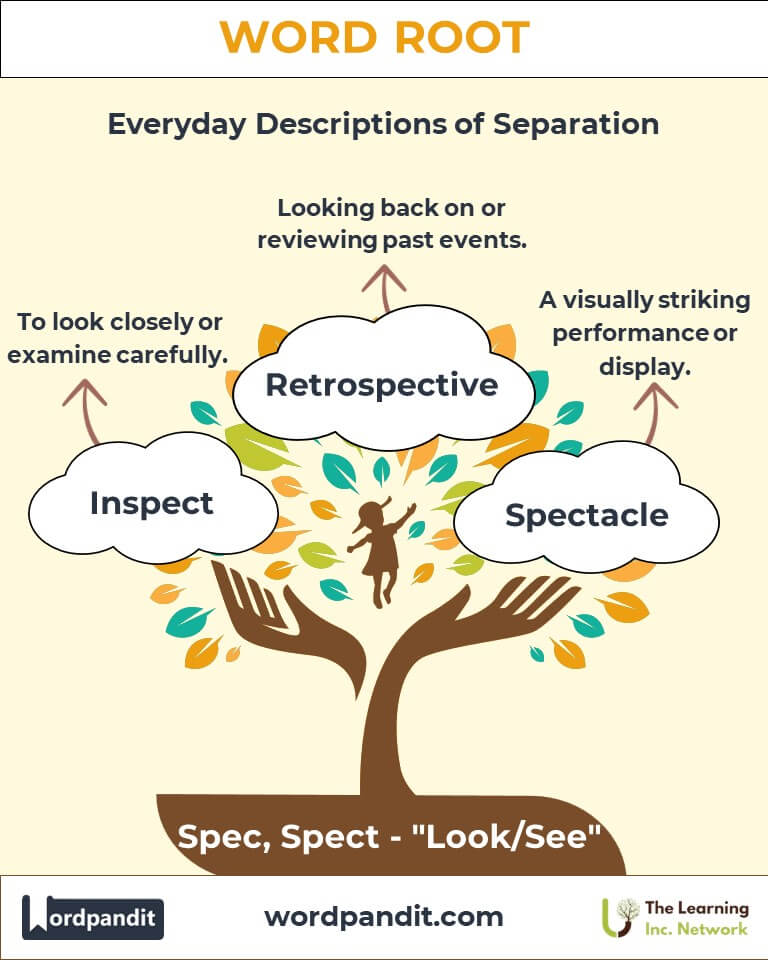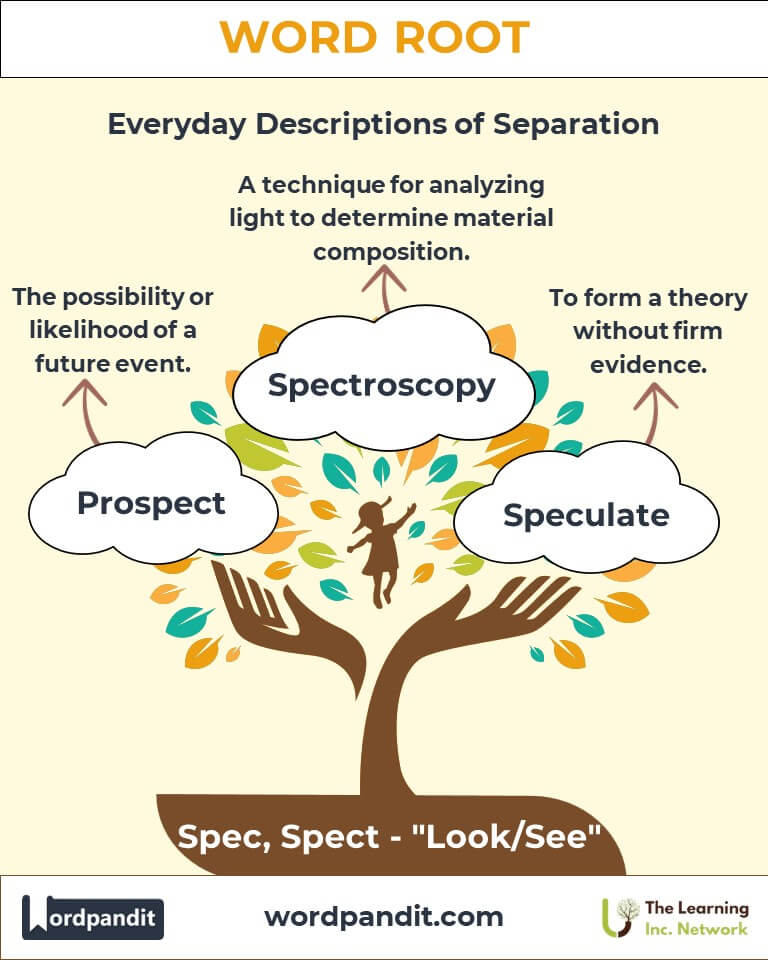Spec and Spect: The Power of Vision in Language and Beyond
Discover the fascinating story of the word roots spec and spect, derived from the Latin specere, meaning "to look" or "to see." From everyday terms like "spectacle" to technical jargon like "speculate," these roots illuminate the importance of observation, vision, and perception across disciplines.

Table of Contents
- Introduction: The Essence of Spec and Spect
- Etymology and Historical Journey
- Mnemonic: Unlocking the Power of Spec and Spect
- Common Spec and Spect-Related Terms
- Spec and Spect Through Time
- Spec and Spect in Specialized Fields
- Illustrative Story: Spec and Spect in Action
- Cultural Significance of the Spec and Spect Roots
- The Spec and Spect Family Tree
- FAQs About the Spec and Spect Word Root
- Test Your Knowledge: Spec and Spect Word Root Quiz
- Conclusion: The Living Legacy of " Spec and Spect "
Introduction: The Essence of Spec and Spect
What do spectacles, inspections, and speculation have in common? They all draw from the Latin roots spec and spect, meaning "to look" or "to see." These roots form the backbone of numerous English words that emphasize observation, analysis, and vision. Whether we’re using spectacles to see clearly or inspecting a problem closely, spec and spect remind us of the power of perception in shaping our understanding of the world.

Etymology and Historical Journey
The word roots spec and spect originate from the Latin verb specere, which means "to look" or "to observe." Over centuries, these roots found their way into Old French and Middle English, becoming integral to words related to seeing and examining. During the Renaissance, the roots gained prominence in technical and philosophical terms like "speculate," reflecting an era of heightened inquiry and analysis.
Mnemonic: Unlocking the Power of Spec and Spect
To remember spec and spect, imagine wearing a pair of spectacles to inspect a tiny, intricate detail on a painting. The connection between "spectacles" and "inspection" captures the essence of these roots.
Mnemonic Device:
“Spec and Spect help you see, inspect, and reflect!”
Common Spec and Spect-Related Terms
- Spectacle (SPEK-tuh-kuhl):
Definition: A visually striking performance or display.
Example: "The fireworks created a dazzling spectacle in the night sky." - Inspect (in-SPEKT):
Definition: To look closely or examine.
Example: "The mechanic inspected the engine for any faults." - Speculate (SPEK-yuh-late):
Definition: To form a theory without firm evidence.
Example: "She speculated about the cause of the mysterious disappearance." - Prospect (PROS-pekt):
Definition: The possibility or likelihood of a future event.
Example: "The prospect of traveling abroad excited her." - Retrospective (ret-ro-SPEK-tiv):
Definition: Looking back on or dealing with past events.
Example: "The artist held a retrospective exhibition of their earlier work."
Spec and Spect Through Time
- Spectacle (Middle Ages): Originally referring to optical devices like lenses, "spectacle" evolved to denote anything visually remarkable.
- Speculate (Renaissance): Derived from the Latin speculatus ("observed"), it initially described careful observation, later broadening to include theorizing without evidence.
Spec and Spect in Specialized Fields
- Medicine:
Spectroscopy: A technique for analyzing light to determine material composition.
Importance: Crucial in diagnosing diseases and studying biochemical processes. - Astronomy:
Spectroscope: A tool to examine the spectrum of light emitted by celestial objects.
Application: Helps scientists determine the composition of stars and galaxies. - Business:
Prospective: Referring to future possibilities or clients.
Example: "The company prepared to meet prospective investors." - Art and Literature:
Retrospective: An exhibit or review focusing on an artist's or author’s past works.
Illustrative Story: Spec and Spect in Action
Detective Mia was known for her sharp eye and keen sense of observation. One day, she was called to inspect a puzzling crime scene. With her trusty spectacles perched on her nose, she carefully scrutinized every detail. Her speculative nature led her to question the apparent evidence, and she soon uncovered a hidden clue that turned the case on its head. Through her powers of inspection and speculation, Mia solved the mystery, earning the admiration of her peers.
Cultural Significance of the Spec and Spect Roots
The roots spec and spect have inspired countless cultural references, from the phrase "a spectacular event" to the philosophical act of introspection. They remind us of the enduring value of observation and analysis, qualities celebrated in literature, art, and even daily life.

The Spec and Spect Family Tree
- Vid/Vis (Latin: "see"):
Video: A recording of visual images.
Vision: The ability to see. - Scope (Greek: "look, view"):
Microscope: An instrument to view small objects.
Telescope: An instrument to view distant objects. - Opt (Greek: "eye, sight"):
Optical: Relating to vision.
Optometrist: A professional who examines eyes.

FAQs About " Spec" and " Spect "
Q: What do the roots "spec" and "spect" mean?
A: The roots "spec" and "spect" come from the Latin verb specere, meaning "to look" or "to see." They appear in many English words that involve observation, analysis, or vision. For example, "spectacle" refers to something seen or observed, while "inspect" means to look closely at something.
Q: What is the origin of the word "speculate"?
A: "Speculate" originates from the Latin word speculatus, meaning "observed" or "examined." Over time, the term broadened to mean forming a theory or hypothesis, often without concrete evidence. It emphasizes a metaphorical "looking" into possibilities or outcomes.
Q: How are "spec" and "scope" related?
A: Both "spec" and "scope" relate to the concept of seeing or observing, but they come from different linguistic roots. "Spec" is from Latin (specere), while "scope" is from the Greek skopein ("to look or examine"). Despite their origins, they often overlap in meaning and usage, such as in "spectroscope."
Q: What is the difference between "inspect" and "respect"?
A: Both words share the root "spec," but they differ in prefixes and meaning. "Inspect" (from in-specere) means "to look into" or examine closely, while "respect" (from re-specere) means "to look again" or "to regard highly." The latter often conveys admiration or consideration for someone or something.
Q: What does "retrospective" mean, and where is it used?
A: "Retrospective" means "looking back on or dealing with past events." It is often used in contexts like art, literature, or film to describe a review or exhibition of an artist’s earlier works. It can also refer to reflecting on past decisions or events in personal or professional life.
Q: What is "spectroscopy," and why is it important?
A: Spectroscopy is a scientific method used to study the interaction of light with matter. By examining the spectrum of light emitted or absorbed by a substance, scientists can determine its composition, structure, or properties. It is crucial in fields like astronomy, chemistry, and medicine.
Test Your Knowledge: " Spec " and " Spect " Mastery Quiz
1. What does the root "spec" mean?
2. Which word means "to examine closely"?
3. What does "spectacle" refer to?
4. Which term involves theorizing without evidence?
5. What tool uses light to analyze materials?
Conclusion: The Living Legacy of Spec and Spect
The word roots spec and spect continue to shape our language and perspectives, reminding us of the profound role observation and analysis play in our lives. From scientific instruments to philosophical concepts, these roots illuminate our quest for understanding. Let them inspire you to "look" deeper into the words you use every day.












